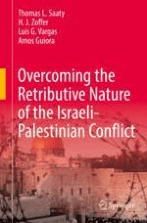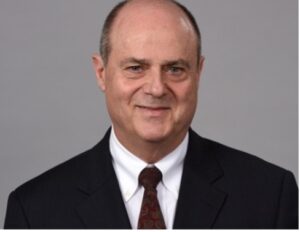
Prospects for the Middle East: Is a Peaceful Settlement Attainable?
DATE: Tuesday, January 18 2022
TIME: 12:00 pm - 1:30 pm MST
LOCATION: Virtual Event
TALK DESCRIPTION:
 A discussion of the new book Overcoming the Retributive Nature of the Israeli-Palestinian Conflict, with authors Amos Guiora, professor of law at the S.J. Quinney College of Law, and Luis Vargas, professor of operations, decision sciences and artificial intelligence at the University of Pittsburgh’s Joseph M. Katz Graduate School of Business.
A discussion of the new book Overcoming the Retributive Nature of the Israeli-Palestinian Conflict, with authors Amos Guiora, professor of law at the S.J. Quinney College of Law, and Luis Vargas, professor of operations, decision sciences and artificial intelligence at the University of Pittsburgh’s Joseph M. Katz Graduate School of Business.
This new book describes the Analytic Hierarchy Process—a unique process that proposes a road map leading to a solution of the Israeli-Palestinian conflict. The model was built using judgments from two groups of experts—with significant knowledge and standing—from each society. The book demonstrates an equitable resolution can be achieved if mainstream members of society are involved, analyzing retributive conflicts.
The book is the product of nine years of intensive, back-channel interaction that addressed issues germane to the conflict including recognition of rights, the sharing of Jerusalem, delineation of borders, West Bank settlements, security, and refugees.
ABOUT THE PANELISTS:
 Amos Guiora, University of Utah S.J. Quinney College of Law
Amos Guiora, University of Utah S.J. Quinney College of Law
Amos N. Guiora is professor of law at the S.J. Quinney College of Law, the University of Utah. He is a distinguished fellow at The Consortium for the Research and Study of Holocaust and the Law at Chicago-Kent College of Law, and a distinguished fellow and counselor at the International Center for Conflict Resolution, Katz School of Business, University of Pittsburgh. Guiora is the inaugural chair of the University of Utah Independent Review Committee, chair of the Gymnastics Canada Task Force on Assault and on the board of advisors for S.E.S.A.M.E., the leading national voice for the prevention of sexual exploitation, abuse, and harassment of students by teachers and other school staff.
Guiora has an A.B. in history from Kenyon College, a J.D. from Case Western Reserve University School of Law, and a PhD from Leiden University. He has published extensively both in the United States and Europe on issues related to human rights, national security, limits of interrogation, religion and terrorism, the limits of power, and multiculturalism.
His most recent book is Armies of Enablers: Survivor Stories of Complicity and Betrayal in Sexual Assaults (2020), https://armiesofenablers.com. His previous books include Populist and Islamist Challenges for International Law (2019); Earl Warren, Ernesto Miranda and Terrorism (2018); The Crime of Complicity: The Bystander in the Holocaust (2017); and Tolerating Intolerance: The Price of Protecting Extremism (2014).
 Luis G. Vargas, The Joseph M. Katz Graduate School of Business, University of Pittsburgh
Luis G. Vargas, The Joseph M. Katz Graduate School of Business, University of Pittsburgh
Vargas is currently professor of operations, decision sciences and artificial intelligence, The Joseph M. Katz Graduate School of Business, University of Pittsburgh, Pittsburgh, PA. He received his B.S. in mathematics and M.S. Operations Research from the University of Granada, Spain, and his Ph.D. in Mathematics from the University of Sevilla, Spain. Vargas was the recipient of the Juan March Foundation Scholarship, Madrid, Spain, to the University of Pennsylvania, where he studied under the guidance of Thomas Saaty and received his Ph.D. in Social Systems Sciences from The Wharton School, University of Pennsylvania. He was chairman of the 2nd International Symposium on the Analytic Hierarchy Process (ISAHP) held in Pittsburgh August 11-14, 1991, at the Joseph M. Katz Graduate School of Business, and the 15th ISAHP held in Hong Kong July 12-15, 2018. He is the author of over 100 papers in refereed journals, and has coauthored five books with Thomas Saaty: The Logic of Priorities: Applications in Business, Energy, Health and Transportation; Prediction, Projection, and Forecasting: The Analytic Hierarchy Process; Decision Making in Economic, Political, Social and Technological Environments with the AHP; Models, Methods, Concepts & Applications of The Analytic Hierarchy Process; and Economic, Political, Social & Technological Applications of The Analytic Network Process (ANP): Benefits, Opportunities, Costs And Risks.
 Moderator: Elizabeth Kronk Warner, University of Utah S.J. Quinney College of Law
Moderator: Elizabeth Kronk Warner, University of Utah S.J. Quinney College of Law
Elizabeth Kronk Warner is dean and professor of law at the S.J. Quinney College of Law at the University of Utah. She was formerly associate dean and professor of law at the University of Kansas School of Law (KU), where she was also the director of the Tribal Law and Government Center.
For questions about this event contact, events@law.utah.edu.
SUBSCRIBE to the S.J. Quinney College of Law event lists to stay current on upcoming College of Law events. You may unsubscribe at anytime.
The S.J. Quinney College of Law is pleased to provide free CLE opportunities for attorneys. All donations welcome to support our programs.
